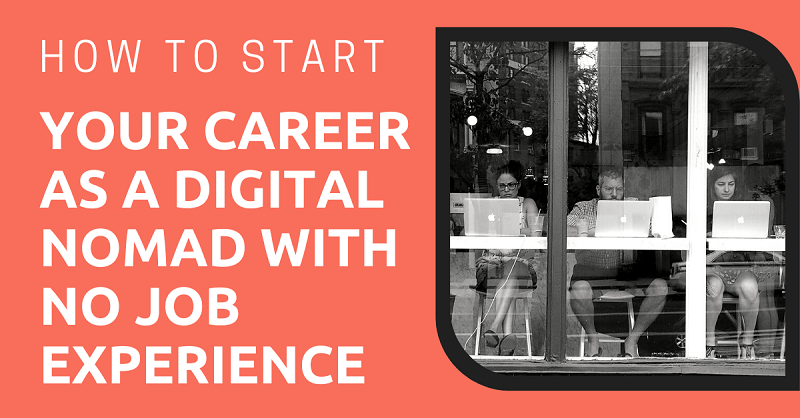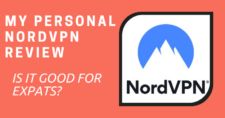
The digital nomad lifestyle has plenty to offer those who want a different take on working abroad. In 2021, there were approximately 35 million digital nomads across the globe, with a 112 percent increase in America alone from the previous year.
The digital nomad trend will continue to rise in the coming years as many more jump on board. So, if you’re interested, how do you get involved? What kinds of jobs are there for beginners who have no experience in the digital nomad world?
That’s exactly what we’ll cover in this guide to digital nomads for beginners. Below, you’ll learn about the 10 best jobs for newbies, along with where to find them and how to get started.
This article will take approximately 16 minutes to read. Don't have the time right now? No worries. You can email the ad-free version of the article to yourself and read it later!
Disclaimer: This article may include links to products or services offered by ExpatDen’s partners, which give us commissions when you click on them. Although this may influence how they appear in the text, we only recommend solutions that we would use in your situation. Read more in our Advertising Disclosure.
Contents
What is a Digital Nomad?
You might have heard the term before, but to recap, a digital nomad is someone who doesn’t have a fixed working location and, unsurprisingly, works online. Although the term can refer to people who work in various domestic places – such as offices and cafes in their home city – it more commonly refers to people who travel across the world.
The main requirement of becoming a digital nomad is an online job that provides enough money for you to live. Although any online job is suitable, there are some important considerations if you plan to work abroad as a digital nomad.
These include:
- Flexibility: The job should ideally be flexible to accommodate different time zones and travel time. After all, you don’t want strict deadlines if you plan to move to a new country.
- Wages: Most digital nomad visas (or standard working visas) have minimum wage requirements. Your job needs to meet these requirements if you plan to stay in a country long-term.
- Accessibility: At the very least, you need a laptop and an Internet connection. Depending on the role, you might need other equipment, which you need to transport when you move.
Provided a potential role meets these requirements, getting started as a digital nomad isn’t too difficult. There are plenty of jobs suitable for beginners that don’t rely on degrees or previous industry experience.
Digital Nomad Jobs for Beginners
Below is a list of the best digital nomad jobs for beginners. While they might require some skills, they won’t necessarily need previous industry experience. They theoretically meet all the requirements listed above, but you need to do some research to ensure they’re suitable for the country you have in mind.
Freelance Writer or Editor
Freelance writing and editing can be incredibly well-paying roles if you know how to position yourself in the industry. While it could take a while to get there, you could end up charging hundreds of dollars for a single article.

The main benefit, therefore, is that you can get away with only working a few hours a day rather than devoting full-time hours. As such, this gives you plenty of time to enjoy the country you’re living in.
You can write about anything you want, but some sectors pay better than others. For example, you can make the most money in tech (such as Web 3.0, emerging tech, etc.) and business strategy.
Unfortunately, the more fun topics — lifestyle, games, home tech, etc. — typically don’t pay that well.
You obviously need a laptop with some kind of word-processing software. A good grasp of the language you’re writing in is obviously helpful, and you want to set up a portfolio on WordPress or similar. Finally, a typing speed of 80 plus words per minute is helpful.
To get started, look on sites like Fiverr and Upwork for one-off jobs, or Problogger for longer-term work. Once you’ve got some experience behind you, you can start approaching brands directly on LinkedIn.
The biggest drawback to freelance writing and editing is that it’s quite a saturated market at entry level. While you can make some serious money once you find a niche, getting started can involve taking on lots of low-paying jobs.
Pros
- very flexible working hours
- minimal equipment required
- pay can be great if you put in the effort
Cons
- you might need to spend a while doing low-paying jobs to establish an industry presence
Content Creator
Content creator is a fairly vague job title, but it’s ideal for digital nomads. In short, it involves creating social media content, whether this is videos for TikTok and YouTube, images for Instagram, or even written brand content.
There are various ways to get involved. If you have a decent online presence, you could start monetizing your own social media pages. However, if you want a salaried job with an established brand, job sites like Indeed are the way forward.
Depending on the type of content you plan to create, a good-quality digital camera could be useful. You can do plenty on your phone, but a digital SLR is the next step in creating professional photos and videos.
You may also need a microphone, and you definitely need a laptop with editing software (Photoshop, Lightroom, Adobe, etc.). As such, it can have quite a high startup cost.
Pros
- plenty of flexibility with industries you can work in
- it’s possible to niche down with a particular platform or type of content
- you can make a lot of money
Cons
- content creation can be hard work
- initial start-up costs can be high
Teaching English Online
Online English teaching is a fairly common way to make money as a digital nomad.
You don’t necessarily need any qualifications, although some companies might expect a TEFL certificate or teaching qualification. At the very least, you need to be able to speak English at a native or near-native level.
In terms of equipment, you need a laptop with a webcam. A microphone headset is also helpful although not a necessity. You also need an Internet connection that’s fast enough to support video calls, which could limit where you work.
There are plenty of sites where you can get started as an online English teacher. Some include VIPKid, Preply, and I-To-I.
Of course, online teaching isn’t restricted to English, or even languages in general. You can find pretty much any online teaching regardless of subject or teaching level. More specialized jobs require specific experience, though.
In addition, teaching English is also one of the most popular jobs for expats.
Related articles:
- My Experience Getting a Teaching Job in Bangkok
- Teaching in Thailand Without A Degree – What Are Your Options?
Pros
- online teaching can be flexible in terms of workload and times
- fairly easy to get started
- minimal tech requirements
Cons
- pay can be low when you first start out
Influencer
Social media influencer crosses over with content creation to an extent. However, it also involves using and reviewing products relating to a specific niche. It’s a pretty popular option for digital nomads, as it generally doesn’t require qualifications and can be done anywhere.

It’s worth noting that it can be harder to get into than you might think. It requires you to organically build an online presence, which can take time and typically means you won’t be earning much money while this happens.
However, once you’re able to establish yourself in a niche, it can be very well-paying.
Getting into online influencing basically involves choosing a main platform and a niche and consistently posting related content. You then need to start reaching out to relevant brands to get a hold of products. There are plenty of guides online that explain it in more detail.
In terms of equipment, a decent smartphone is useful, as is a laptop and a camera, depending on how you plan to make content. You can get started with very little, but it’s worth investing in decent tech if you want to build a professional image.
Pros
- it’s possible to get started without industry experience or qualifications
- niche industries can be easier to break into
- you get plenty of free products to supplement the money you make
Cons
- influencing can be a lot more work than you expect
Travel Blogger
Although travel blogging could come under the title of freelance writing, it deserves its own attention.
After all, if you’re a digital nomad living abroad, you likely have plenty of thoughts and advice for people traveling. You can write about your travel experience and share your travel tricks while traveling the world.

How do you get started? Well, you could set up your own blog on a site like WordPress, which you could eventually monetize with ad space.
Alternatively, you could write and pitch articles to established sites such as Matador Network or Wanderlust.
The requirements are pretty much identical to freelance writing: you need a decent command of your writing language, a laptop for writing on, and photography and videography skills.
However, the requirements also cross over with influencing to an extent – you ideally want a niche if you plan to make good money.
Pros
- ideal for putting your practical experience to work
- fairly easy to set up with minimal requirements
- you can run your own site and pitch to larger publications for extra income
Cons
- it can take a few years to properly monetize a personal blog
Social Media Manager
Social media management typically involves curating a brand’s presence on its social media platforms. This includes creating and sharing posts, responding to comments and messages, and planning content strategies.
It’s a fairly wide-ranging job description, but that’s part of its draw for digital nomads.
There are different ways to get started. If you have credible experience, you could approach companies directly.
Failing that, job boards on sites like Indeed often list plenty of roles. Provided you’ve got an Internet connection and plenty of time, social media management is an attractive option.
While not a requirement, it’s helpful if you have a good personal social media presence. It serves as a kind of portfolio, as you need some kind of reference to prove you can do the job.
Pros
- flexible opportunities to work with brands that appeal to your experience
- suitable salary range depending on the industry
- doesn’t require loads of equipment – a laptop is enough
Cons
- time-intensive – you often need to be available to respond to comments and messages
Virtual Assistant
Being a virtual assistant can work quite well as a digital nomad. Provided you’re organized and know your way around standard computer software, you’ve pretty much got all the skills needed to work in this industry.
Unsurprisingly, a virtual assistant does everything a normal assistant does, just online. This includes managing a person’s daily tasks, bookkeeping, managing social media, customer service, help in marketing, and general admin.
You could do this for a company or a single person depending on how much time you have.
At the very least, you need a laptop and phone. You might need specific software depending on your role, too. Sites like Upwork list virtual assistant jobs, as does Indeed. The only real downside to virtual assistant work is that it can be restrictive in terms of time zones. After all, having an assistant who’s asleep during your working day isn’t super helpful.
Pros
- doesn’t require much in terms of equipment and previous experience
- it can be a good route into more niche digital nomad jobs
- the amount of work can be fairly flexible
Cons
- one of the more restrictive digital nomad jobs in terms of working times
Find out more: The Complete Guide to Hiring Virtual Staff
Web Development
Web development is arguably one of the more specialized jobs on this list.
However, plenty of sites have courses that teach you everything you need to know. If you’ve got some coding and design skills, sites like Upwork and Fiverr are good places to start.
Once you’ve met the skill requirements, there are plenty of directions you can take web development. For example, you could specialize in app development or work alongside a marketing agency to help with their services. Alternatively, you could keep your work entirely freelance.
Other than a laptop, you need to buy some software. This is the biggest startup cost (other than the course you might need to take). But one of the main benefits of web development is that it can be incredibly well-paying, so you should make this money back quite quickly.
Pros
- quite a flexible industry – plenty of specialization
- it’s possible to reduce your working hours due to pay opportunities
- requires less equipment than you might expect
Cons
- startup costs can be quite high
Graphic Design
Graphic design is to art what freelance writing is to language. It’s a great industry for artistically minded people, and there’s plenty of opportunity for specialization. You could do anything from logo design and web design to designing and selling digital art.

To get started, you want something to draw on, ideally a tablet. It’s also worth building a portfolio, as graphic design is unsurprisingly a visually focused industry. A laptop isn’t as important as it is for other jobs, but it’s helpful for communicating with clients or dealing with orders.
Again, sites like Fiverr and Upwork are good places to start. You could also try a site like Dribbble, which has a specific category for graphic designers.
If you plan to set up a site for selling your own work, look into drop shipping combined with a site like Spotify. It means you don’t need to manage your stock – instead, you post images and another company takes care of the printing and shipping.
This makes it a more passive form of income.
Pros
- provided you’ve got a portfolio, you don’t need much experience
- plenty of options for finding a niche
- startup costs are minimal if you already have the equipment
Cons
- as with freelance writing, it’s quite a saturated industry – finding good work can take a while
Other
There are so many other jobs that are suitable for digital nomads. Some of the best of the rest include:
- Marketing: This can combine plenty of the roles listed above and would focus on the entire marketing journey for a certain brand.
- House Sitting: There’s not much to say here. Using a site like Trusted House Sitters allows you to live somewhere and make money while doing so.
- Online translation or transcription: These obviously require more skill than standard writing, as you need to be fluent in more than one language.
- Remote worker: Again, this is a fairly vague job title, but plenty of industries have switched to remote employees since the pandemic.
The bottom line is that there are plenty of other beginner roles for digital nomads.
However, the ones mentioned above typically require more skills or equipment than the other entries listed in this article.
Now, On to You
As you can see, the online working world is incredibly varied, meaning there are plenty of opportunities for those looking to become digital nomads.
The best starting point is to assess your current skills and interests before researching a specific industry to see what kind of money can be made.
Most importantly, check whether you can earn enough for the visa requirements needed for your country of choice. After all, there’s no point in doing a job if it doesn’t pay the bills.
Related articles:







